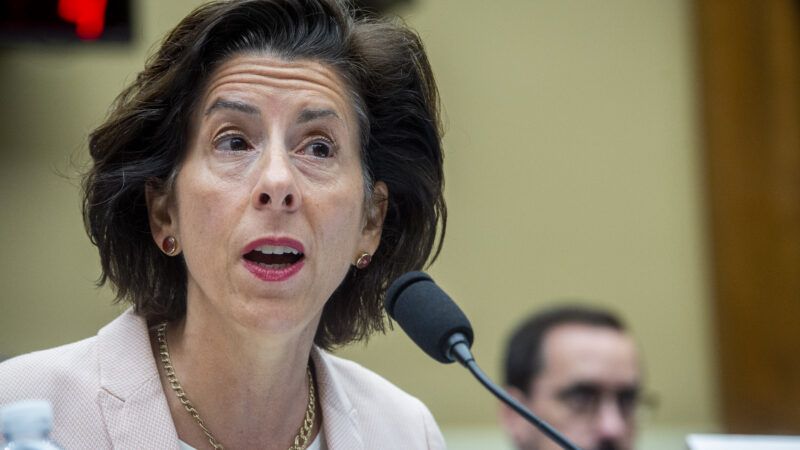Commerce Department Bans Chinese Car Components
Commerce Secretary Raimondo insists the rule "is a strictly national security action."

Slapping a 100 percent tariff on Chinese electric vehicles apparently isn't enough to protect American national security. The Department of Commerce is now banning Chinese auto parts too.
Secretary of Commerce Gina Raimondo says that "it doesn't take much imagination to understand how a foreign adversary with access to [cameras, microphones, GPS tracking, and other technologies connected to the internet] could pose a serious risk to both our national security and the privacy of U.S. citizens," Politico reports.
The insufficiently imaginative would appreciate Raimondo enumerating her specific concerns about Chinese-made car parts so that they may evaluate her reasoning. Fortunately, Raimondo was kind enough to clarify her concerns: "A foreign adversary could shut down or take control of all their vehicles operating in the United States."
The U.S. is China's largest trading partner, making up 14.8 percent of China's $3.73 trillion in 2022 exports, according to the Observatory of Economic Complexity. If the Chinese Communist Party (CCP) deliberately sabotaged "Vehicle Connectivity System (VCS) hardware and covered software," as specified by the Commerce Department's rule, it must be prepared to forgo hundreds of billions of dollars of income for the rest of the nation's existence. It's not.
Understanding that China is unlikely to adopt such a suicidal strategy, the German Automotive Industry Association urged the Department of Commerce to limit the scope of its rule making, stating "not all…components from countries of concern pose a threat to national security," per Politico. The plea for rationality fell on deaf ears at the Department of Commerce, with Raimondo describing the hundreds of thousands of Chinese-made cars in Europe as a "cautionary tale," reports NPR.
The rule warns that China and Russia "pose particular risks to U.S. national security because of…their current and anticipated growth and involvement in the automotive sector," among other reasons. But Chinese parts made up only $14.4 billion of America's $458 billion imported vehicles and parts last year (3 percent) and Russia "is not a significant supplier…of either," Politico reports.
Raimondo insists that the rule "is not about trade or economic advantage." When asked about the rule, President Joe Biden's national economic adviser, Lael Brainard, said that "the Biden-Harris administration believes the future of the auto industry is made in America by American workers," NPR reports. Brainard's buy-American line suggests protectionism isn't entirely unrelated.
If American security were truly jeopardized by Chinese vehicles and parts, the Department of Commerce probably wouldn't permit the "the import of the VCS Hardware…prior to January 1, 2029"—more than four years from now—as its rule currently does. The department also wouldn't want to make carve-outs for vehicles "driven on public roads for fewer than 30 calendar days per year," which Politico notes would include mining and agricultural vehicles.
Executive Order 13873, which sanctions the rule, aims to mitigate the "undue risk of catastrophic effects on the security or resiliency of United States critical infrastructure." Surely an adversary would certainly want to disable American manufacturing vehicles before launching a military campaign against the U.S.
Citizens, American or otherwise, alienate their privacy to firms in exchange for goods and services all the time. (See: social media.) Although much ado is made about the "exfiltration of sensitive U.S. persons' data," the rule focuses on data generated "from fleet vehicles used by emergency response." The rule does not clarify how an American civilian driving his private car would provide the CCP with such information.
The Department of Commerce's claim that its rule protects Americans' privacy and security is dubious. That the rule protects American automobile manufacturers from Chinese competition is certain.


Show Comments (42)